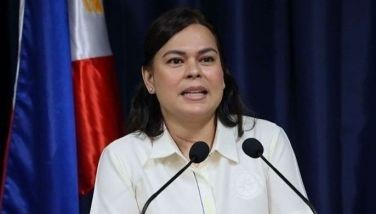Palace: BIFF remains a threat
MANILA, Philippines - Considering the Bangsamoro Islamic Freedom Fighters (BIFF) still a threat, the government yesterday called on the rebels to lay down their arms or face continued pursuit by authorities.
In a press briefing, Presidential Communications Operations Office Secretary Herminio Coloma Jr. said the government wants to achieve peace in Mindanao, and would do everything to end violence and keep people out of danger.
There had been no indication that BIFF leader Ameril Umbra Kato was killed during the military operation against the group that ended Sunday.
The military terminated its operations, saying the offensives have significantly reduced the capability of the rebels to launch attacks.
Coloma said the Armed Forces of the Philippines is checking reports that the BIFF and the Moro National Liberation Front forces led by its founding chairman, Nur Misuari, have joined forces against the government.
He said intelligence operatives would check the movements of enemies of the state to ensure they would not hamper the peace process between the government and the Moro Islamic Liberation Front (MILF).
Coloma said they had been asking all groups to join the peace process but there were elements that still opted to use force.
“That’s why our response is to also use the arm of the law to prevent their illegal acts,†he said.
He said authorities are making sure these armed groups would not become bigger threats by employing decisive action when necessary.
Peace and dev’t councils
Meanwhile, peace panel member Mejol Sadain said the main thrust of the normalization agreement is the conversion of MILF camps into peace and development communities.
These are Camps Abubakar, Omar and Badar in Maguindanao; Camp Bilal, which straddles Lanao del Norte and Lanao del Sur; Camp Rajamudah in North Cotabato, and Camp Bushra in Lanao del Sur.
Sadain, who is also a commissioner of the National Commission on Muslim Filipinos, said the other components of normalization are policing, normalization and transition period, joint normalization committee, joint peace and security committee and joint peace and security details.
He said decommissioning strategies have yet to be ironed out by the Independent Decommissioning Body, which is composed of three foreign and four local experts and chaired by a representative from Canada.
Sadain said decommissioning does not only focus on the MILF armed forces but also of the private armed groups, which are part of the policing strategy to be conducted jointly by the MILF and the government.
He also reiterated that the Bangsamoro Basic Law being drafted by the 15-man Bangsamoro Transition Commission (BTC) will be within the bounds of the Constitution.
“The BTC is allowed to identify which of the provisions they want to be included that will need constitutional amendments. But what they can include in the basic law are only those that do not need constitutional amendments, meaning they have to work within the Constitution,†he said.
Sadain added that even if the BTC can identify provisions that will need constitutional amendments, it does not mean there will be constitutional amendments in the future.
“It is just identification that in the event that there will be constitutional amendment, then these are the provisions that they can include. But you all know that the President has already spoken and he does not see any constitutional amendments within his term,†he said.
The basic law, which will replace the current Republic Act 9054, will legalize the creation of the Bangsamoro region in Mindanao. – With Roel Pareño
- Latest
- Trending





























